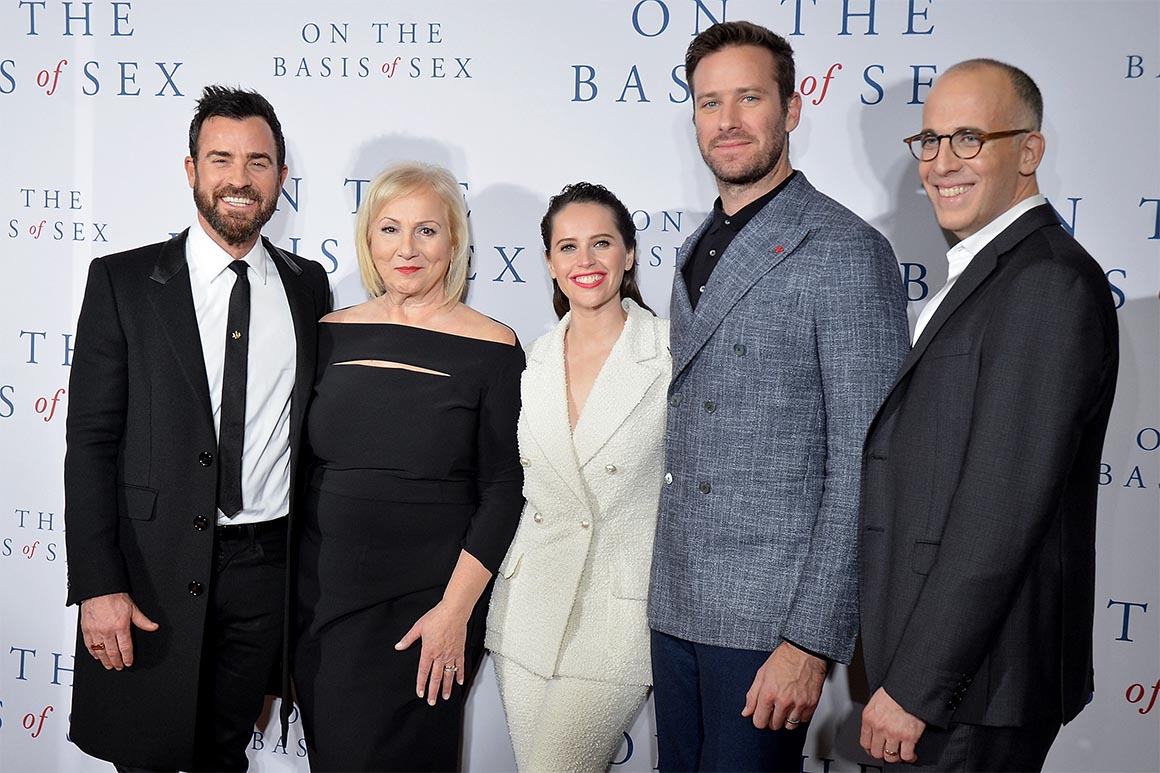By: Peter Canellos – politico.com – December 25, 2018
The new Ruth Bader Ginsburg biopic “On the Basis of Sex” begins grandly, with an all-male chorus singing “Ten Thousand Men of Harvard,” the university’s storied—and flagrantly sexist—fight song. The men sing in that peculiarly reverential tone used for a collegiate alma mater, their creamy tenors caressing every syllable. On the screen, an ocean of besuited young men—and one young woman—flows solemnly toward the Greek Revival temple of learning known as Harvard Law School.
It’s 1956, and Ginsburg is one of only nine women in the class, facing the slings and arrows of sexist men of all ages. The opening scene will be deeply satisfying, especially for viewers who have joined the burgeoning cult of RBG, because they know what those students obviously didn’t: That Ginsburg will end up sitting on the Supreme Court, long after most of the guys who beat her out for law firm jobs have retired to the golf course. More than that, the elderly Ginsburg will become a cultural icon of still-uncharted dimensions.
“On the Basis of Sex,” a full Hollywood production in which the young Ginsburg is played by Felicity Jones, is the latest entry in the popular movement that presents the pioneering women’s-rights attorney as a kind of progressive superhero. The film is a myth-building exercise for a woman who’s reached mythic stature in a shockingly short period of time.
Like the highly successful “RBG” documentary released earlier this year, “On the Basis of Sex” satisfies a yearning for a liberal heroine in a time of disappointment and cynicism. As a work of cinema, it paints a vivid picture of an era, now passing from memory, when women were completely, rigorously excluded from power. It also offers an intelligent rendering of the struggles to achieve legal equality for women (still ongoing, though you wouldn’t necessarily know it from the story).
As a cultural artifact in the deification of RBG, however, you might say that it—like some of the court decisions it calls into question—sets a dubious precedent.
In the broader sweep of American history, this is an inopportune moment to present a current Supreme Court justice as a political hero. Last month, after President Donald Trump dismissed a ruling against his migrant policy as the action of an “Obama judge,” Chief Justice John Roberts took the unusual step of responding directly, declaring in a statement that “We do not have Obama judges or Trump judges, Bush judges or Clinton judges. What we have is an extraordinary group of dedicated judges doing their level best to do equal right to those appearing before them. The independent judiciary is something we should all be thankful for.”
Trump shot back on Twitter: “Sorry, Chief Justice Roberts, but you do indeed have ‘Obama judges,’ and they have a much different point of view than the people who are charged with the safety of our country.”
By the standard of civic disagreements in the Trump era, this was a high-minded exchange, and a revealing one. No doubt many liberals found themselves essentially agreeing with Trump: Republicans have politicized the judicial nomination process, so everyone must look for chances to elevate “our kind” of judges. There’s an element of regret built into that view: In an ideal world, more like the one of four decades ago, judges would be regarded less in terms of who appointed them than how well they live up to their oaths to provide independent justice, without fear or favor.
There are many reasons that the judicial system has strayed. Presidents making ideologically motivated appointments, rather than seeking consensus, is one. The bare-knuckled brutality of the confirmation process is another. Even if nominees aren’t particularly partisan at the outset, they quickly learn to recognize their friends and enemies; the loyalties forged in the furnace of the confirmation process carry over onto the bench. It’s only human that such anger or gratitude, growing out of a trauma that some compare to a near-death experience, would alter judicial decision-making.
There’s a third element to the politicization of the courts, though. That’s the visceral sense of approval and validation that judges get when they please their fans. The 60,000-member Federalist Society provides conservative judges with a Greek chorus of admirers. And many members of the Supreme Court, such as the late Antonin Scalia, couldn’t resist taking bows before conservative audiences for court rulings that devastated liberals.
To see the remainder of this article, click read more.
Source: Why We Should Worry About the Cult of RBG – POLITICO Magazine
 Listen Online
Listen Online Watch Online
Watch Online Find a Station in Your Area
Find a Station in Your Area








 Listen Now
Listen Now Watch Online
Watch Online
